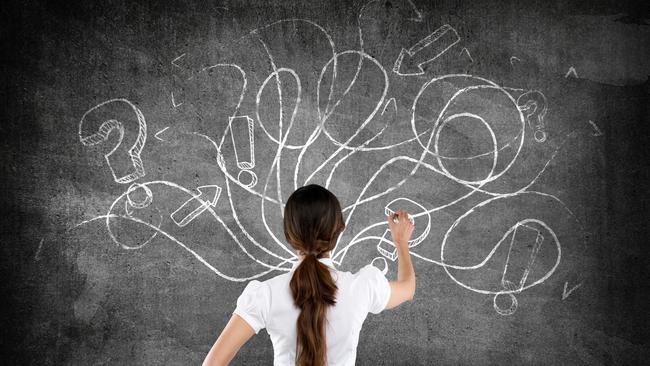Curiosity and perseverance the key to high marks, new study reveals
Australian students are more likely to skip homework if it’s too hard or takes too long, a worldwide study of teenage attitudes to schoolwork reveals.

Curiosity and perseverance are the secret to students’ success at school, the first worldwide survey of teenage personality reveals.
Teenagers who like to ask questions and learn new things performed better than other students in a global mathematics test.
Perseverance also produced higher test scores, the Australian Council for Educational Research (ACER) revealed on Tuesday after analysing the test results from 13,437 students from 743 Australian high schools.
Australian students scored an average of 472 points on the global maths test, but the ACER analysis shows that curious students scored a bonus 81 points, while teenagers who persevered with difficult lessons and homework gained 61 extra points.
Students whose parents reached out to talk to teachers about school work performed up to 27 points higher than average.
The students took part in the Organisation for Economic Co-operation and Development (OECD) tests and surveys of 690,000 15-year-old students from 81 countries in 2022, through the Program for International Student Assessment (PISA).
The data draws a link between student wellbeing and resilience, and good academic results.
High-performing mathematics students reported being significantly more curious than other classmates.
Australian students are more curious than English, Chinese or Dutch students, as well as students in 17 other industrialised countries.
Only students in Singapore, Korea and Canada reported significantly higher levels of curiosity than Australian children.
Eighty per cent of Australian teenagers reported that they were curious about “many different things”, and that they “like to know how things work”.
Half Australia’s students said they like to ask questions, and two-thirds enjoy learning about new things.

ACER lead researcher Lisa De Bortoli curiosity is important in education and in life.
“Being curious can help students adapt to different environments, including developing tolerance to anxiety and uncertainty.
“It promotes critical thinking.’’
The ACER analysis found that perseverance among Australian students is lower than the OECD average, with students in Austria, Switzerland, Denmark and Singapore most likely to stick with homework and difficult problems.
One in three Australian students said they “quit doing homework if it is too long’’, compared to an average of one in four students across the OECD.
Only 57 per cent of Australian teenagers said that they “keep working on a task until it is finished’’, compared to the OECD average of 62 per cent.
Students in government schools reported lower perseverance than students in private or Catholic schools.
The OECD analysis shows that Australia has more chaotic classrooms and crippling teacher shortages than most industrialised nations.
Nearly 90 per cent of Australian high school principals have reported that staff shortages, or “inadequate or poorly trained’’ teachers, are impacting their ability to educate teenagers.
One in three Australian teenagers is in a classroom where students do not listen to what the teacher says during most or every maths lesson.
The proportion of Australian students affected by teacher shortages has tripled since 2015.







To join the conversation, please log in. Don't have an account? Register
Join the conversation, you are commenting as Logout